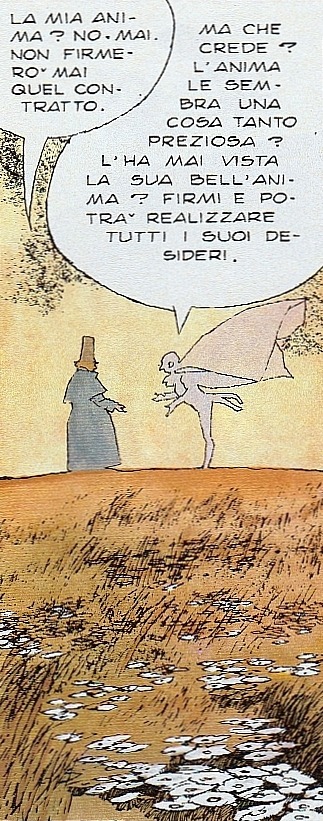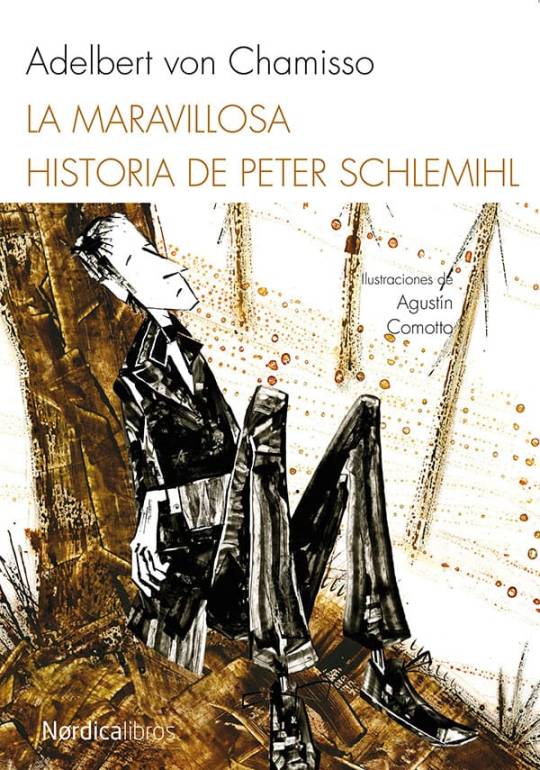#chamisso
Explore tagged Tumblr posts
Text
It was therefore with great interest that I found Chamisso, the justly distinguished naturalist who accompanied Kotzebue, stating that the inhabitants of the Radack archipelago, a group of lagoon-islands in the midst of the Pacific, obtained stones for sharpening their instruments by searching the roots of trees which are cast upon the beach.
"Journal of Researches into the Natural History and Geology of the Countries Visited During the Voyage of H.M.S. Beagle Round the World, 1832-36" - Charles Darwin
#book quote#the voyage of the beagle#charles darwin#nonfiction#adelbert von chamisso#chamisso#otto von kotzebue#kotzebue#radack archipelago#pacific islands#stones#tree roots#washed ashore#flotsam#jetsam#wrack
0 notes
Text
Dichter, Naturkundler, Welterforscher: Adelbert von Chamisso und die Suche nach der Nordostpassage
Buchvorstellung Im September 2014 veröffentlichte Michael E.W. Neÿ auf dem KRAUTJUNKER den interessanten Blogbeitrag Aufbruch in die neue Welt – mit Humboldt, Chamisso und Forster auf großer Fahrt. Insbesondere seine Vorstellung des Buches Dichter, Naturkundler, Welterforscher: Adelbert von Chamisso und die Suche nach der Nordostpassage ließ mich nicht mehr los, denn wie wundersam ist es, dass…
#Adelbert von Chamisso#Buchvorstellung#Dichter#Dichter Naturkundler Welterforscher Adelbert von Chamisso und die Suche nach der Nordostpassage#Matthias Glaubrecht#Naturkundler#Rezension#Verlag Galiani Berlin#Welterforscher: Adelbert von Chamisso und die Suche nach der Nordostpassage
2 notes
·
View notes
Text


Die liebsten Gedichte des Königs (6/12)
König Ludwig liebte die Poesie ebenso wie die Welt der Sagen und Mythen. In der heutigen Ballade verbinden sich diese beiden Dinge, doch damit nicht genug. Die Kernaussage des Dichters, er heißt Adelbert von Chamisso, muss Ludwig tief bewegt haben. In seinen Versen atmet man die Luft des Mittelalters und ihre Werte und Ideale: Des Königs erhabenes unantastbares Wort und die ritterliche Tugend der Milde und Barmherzigkeit . . .
Die Weiber von Winsperg
1831.
Der erste Hohenstaufen, der König Konrad, lag mit Heeresmacht vor Winsperg seit manchem langen Tag; der Welfe war geschlagen, noch wehrte sich das Nest, die unverzagten Städter, die hielten es noch fest. Der Hunger kam, der Hunger! das ist ein scharfer Dorn; nun suchten sie die Gnade, nun fanden sie den Zorn. "Ihr habt mir hier erschlagen gar manchen Degen wert, und öffnet ihr die Tore, so trifft euch doch das Schwert." Da sind die Weiber kommen: "Und muß es also sein, gewährt uns freien Abzug, wir sind vom Blute rein." Da hat sich vor den Armen des Helden Zorn gekühlt, da hat ein sanft Erbarmen im Herzen er gefühlt. "Die Weiber mögen abziehn, und jede habe frei, was sie vermag zu tragen und ihr das Liebste sei! Laßt zieh'n mit ihrer Bürde sie ungehindert fort!" Das ist des Königs Meinung, das ist des Königs Wort. Und als der frühe Morgen im Osten kaum gegraut, da hat ein selt'nes Schauspiel vom Lager man geschaut: Es öffnet leise, leise sich das bedrängte Tor, es schwankt ein Zug von Weibern mit schwerem Schritt hervor. Tief beugt die Last sie nieder, die auf dem Nacken ruht, sie tragen ihre Eh'herrn, das ist ihr liebstes Gut. "Halt an die argen Weiber!" ruft drohend mancher Wicht; Der Kanzler spricht bedeutsam: "Das war die Meinung nicht." Da hat, wie er's vernommen, der fromme Herr gelacht: "Und war es nicht die Meinung, sie haben's gut gemacht; gesprochen ist gesprochen, das Königswort besteht, und zwar von keinem Kanzler zerdeutelt und zerdreht." So war das Gold der Krone wohl rein und unentweiht. Die Sage schallt herüber aus halbvergess'ner Zeit. Im Jahr elfhundertvierzig, wie ich's verzeichnet fand, galt Königswort noch heilig im deutschen Vaterland.
Adelbert von Chamisso
2 notes
·
View notes
Text

yesterday on a short walk i saw flowers i never saw here before isnt that delightful
#i Think. it is chamisso arnica. which is native ! also exciting#lots of blueberries out already too
4 notes
·
View notes
Text


Moses & Felix Mendelssohn | Adalbert von Chamisso: "Abba Glusk Leczeka" (1832) | Heinrich Heine, Deutschland. ein Wintermärchen ch. 16 (1844)
The poets are being weird about them & I don't know what to make of it
#I mean I don't know about Heine#sarcastic little guy is kind of his brand#I'm much more distrustful of Chamisso#can't a guy honor the intellectual legacy of his grandpa without people supposing it backwards?#Moses Mendelssohn#Felix Mendelssohn#Adalbert von Chamisso#Heinrich Heine#Abba Glusk Leczeka#Deutschland ein Wintermärchen#Germany a Winter's Tale#studia felicitatis
4 notes
·
View notes
Text
Tragische Geschichte
's war Einer, dem's zu Herzen ging,
Daß ihm der Zopf so hinten hing,
Er wollt' es anders haben.
So denkt er denn: wie fang' ich's an?
Ich dreh' mich um, so ist's gethan -
Der Zopf, der hängt ihm hinten.
Da hat er flink sich umgedreht,
Und wie es stund, es annoch steht -
Der Zopf, der hängt ihm hinten.
Da dreht er schnell sich anders 'rum,
's wird aber noch nicht besser drum -
Der Zopf, der hängt ihm hinten.
Er dreht sich links, er dreht sich rechts,
Es thut nichts Gut's, es thut nichts Schlecht's -
Der Zopf, der hängt ihm hinten.
Er dreht sich wie ein Kreisel fort,
Es hilft zu nichts, in einem Wort -
Der Zopf, der hängt ihm hinten.
Und seht, er dreht sich immer noch,
Und denkt: es hilft am Ende doch -
Der Zopf, der hängt ihm hinten.
Adelbert von Chamisso . 1781 - 1838
#Adelbert von Chamisso#everybody check him out he’s my new favorite ever poet#Das Riesenspielzeug und Die Alte Waschfrau sind so gut auch#tragische Geschichte
1 note
·
View note
Text
"Adelbert von Chamisso ... Nordostpassage" von Matthias Glaubrecht - Rezension von Manfred Orlick - Literaturkritik.de
Ein romantischer Dichter, der drei Jahre um die Welt segelte. Matthias Glaubrecht stellt in seiner neuen Biografie den Naturkundler und Welterforscher Adelbert von Chamisso vor Eine Rezension von Manfred Orlick Hördauer 11 Minuten https://literaturradiohoerbahn.com/wp-content/uploads/2023/12/literaturkritik-de-M-Glaubrecht-Chamisso-upload.mp3 Adelbert von Chamisso (1781-1838) (eigentlich:…

View On WordPress
#Adelbert von Chamisso#Galiani Verlag#Literaturkritik.de#Manfred Orlick#Matthias Glaubrecht#Nordostpassage#Rezension#Uwe Kullnick
0 notes
Text
After our wonderful premiere weekend, we can a little résumé today:
Not only have 341 people now watched the - admittedly rather cheap - Lisztomanie video, no, we also seem to have a clear favourite among the album songs with the most listeners. And that's another @franzliszt-official Lisztober song….Die Zelle in Nonnenwerth. :)
I'm particularly pleased about that, because the daily view of the Rolandsbogen in the fog was extremely inspiring for the whole month. Oh, Franz. One day we'll make it over again and we'll hug your plantain on the island ;)

Just to make another small connection, how you can find connections everywhere and how small the world is: Ferdinand Freiligrath, who wrote the poem ‘Oh lieb, so lang Du lieben kannst’ (aka Liszt's Liebentraum No 3), lived here for a few years in the neighbouring village and fought for the reconstruction of the Rolandsbogen.
And a few streets further on is Karl Simrock's ‘Haus Parzival’, where the Grimms, Heine, Chamisso and von Humboldt hung out.
Somewhere next to the Rolandsbogen, by the way, Nietzsche once wanted to fight a duel.
So you see, inspiration can sometimes be so close at hand.
6 notes
·
View notes
Text
Aufbruch in die neue Welt - mit Humboldt, Chamisso und Forster auf großer Fahrt
von Michael E.W. Neÿ „Wage zu wissen“ oder „Wage es Dich Deines eigenen Verstandes zu bedienen“ wurde 1784 von Kant, in Anlehnung an die Aufforderung Horaz (20 v.Chr.), weise zu sein, zur Maxime der Aufklärung erklärt. Aufklärung sei, so Kant, „der Ausgang des Menschen aus seiner selbst verschuldeten Unmündigkeit.“ Unmündigkeit wiederum, so der Königsberger Philosoph, sei „das Unvermögen, sich…
#Adelbert von Chamisso#Alexander von Humboldt und die Erfindung der Natur#AUFKLÄRUNG – Das deutsche Jahrhundert#Buchvorstellung#Dichter#Magnificient Rebels – The First Romantics and the Invention of the Self#Naturkundler#Weltenforscher – Adelbert von Chamisso und die Suche nach der Nordostpassage
1 note
·
View note
Text

Storia meravigliosa di Peter Schlemihl (2ª parte) Adalbert von Chamisso e Dino Battaglia La seconda parte della storia apparsa sul Giornalino dal nº 4 del 23 gennaio 1983 al nº 5 del 30 gennaio 1983. Oggi sul blog.
15 notes
·
View notes
Text
....Una bella poesia semplice ma che riesce a dare una bella scossa a una giornata no di Adelbert Von Chamisso
“Nei miei giri della vita
su verdi campi ho riposato,
e ho intonato un canto,
e tutto era dolce, bello.
Se solitario, se affannato
Dalle mie tristi inquietudini,
ancora ho intonato un canto
e tutto di nuovo era bello.
Sempre ho lasciato sbollire
Ogni mia ira in silenzio,
sempre ho ripreso a cantare
e tutto di nuovo era bello.
Non si continui il lamento:
‘sempre, ogni cosa è dolore’:
cantare, ancora cantare!
E tutto di nuovo è bello.
9 notes
·
View notes
Text
Durante il poco tempo nel quale ho avuto la fortuna di rimanerle accanto, caro signore, ho avuto l'agio di osservare più volte - mi consenta di dirlo - la bella, davvero bella ombra che lei proietta al sole con un certo qual nobile disdegno, quasi senza prestarvi attenzione. Sto parlando proprio di quella straordinaria ombra che adesso si trova lì, ai suoi piedi. Mi perdoni la proposta certamente temeraria: avrebbe qualcosa in contrario a vendermela, quella sua ombra?

Adelbert von Chamisso
7 notes
·
View notes
Text
The Pity of it All Review
Today I finished The Pity of it All: a History of Jews in Germany, 1743-1933 by Amos Elon. I picked it up because I'm a USAmerican who's probably specializing in German-Jewish studies and I'd heard of it as one of the most famous texts in the field. For the sake of record-keeping, I've got a non-comprehensive pros and cons list for the book.
Pros:
Because it's written for a wider readership than academic histories, Elon's writing is really compelling. I kept surprising myself with how excited I was to read the next chapter, even for a narrative with which I am familiar.
My feelings about Heinrich Heine were never simple but boy did they get more complex!
A lot of the problems I have with the book come from its fame. It's easier to see what it ignores or could have been because I'm familiar with other corners of the field, and when it came out, it was probably reacting to scholarship of which I am not yet aware and which presented a similarly-limited portrait.
There are translations of poems which I did not know existed in translation!
Cons:
Well, it's limited. Because it's interested in German Jews' contributions to German cultural life, it mostly retells the lives of prominent artists and writers. Because it is a narrative of assimilation, it mostly depicts the assimilated middle and upper classes, even during periods where immigration was higher. And because it starts in 1743, before the first waves of unificatory nationalism, it doesn't commit to a geographic scope. Its interest in Austria-Hungary extends to Kafka and Zweig but not to social conditions in Vienna or Prague. And while I, a Herr Moses in Berlin enjoyer, appreciated the focus on that city, Elon admits that it was never where most ordinary German-Jewish people lived. A greater focus on social history might have made for a more comprehensive portrait.
When offered the choice between narrative or explanation, it tends to choose the former. The snippet of Chamisso's "Abba Glusk Leczeka" which Elon quotes is not, as he frames it, the voice of the poet, but that of the main character, an 18th-century figure speaking to Moses Mendelssohn, not his son Abraham. Likewise, because the book begins with Mendelssohn's entry to Berlin, it has to end with an exit.
The translations of the poems were not usually very good. I think I could make better ones if I had the time, and for some (eg "Abba Glusk Leczeka") I might need to.
Next it's back to academic articles with Berlin's Forgotten Future!
#The Pity of it All#Amos Elon#Heinrich Heine#heine#Moses Mendelssohn#Mendelssohn#den dichter bekennen#Herr Moses in Berlin#sherb's sub sub library#studia felicitatis
3 notes
·
View notes
Text

Durante un viaje —cuenta Chamisso en una carta—, perdí el sombrero, la manta de viaje, los guantes, el pañuelo de bolsillo, y todo lo que llevaba. Fouqué me preguntó si no había perdido también la sombra, y ambos nos representamos una desgracia semejante. En otra ocasión hojeé un libro de Lafontaine en el que un hombre complaciente, en medio de un grupo de personas, saca de su bolsa todos los objetos que le van pidiendo. Se me ocurrió que quizá si se le pedía de la forma conveniente, aquel hombre sería capaz de sacar de su bolsa un carruaje con sus caballos. Así quedó listo el Peter Schlemihl, y me puse a escribirlo en el campo, cuando el aburrimiento y el ocio me lo permitieron.
Quién diría que una de las obras más queridas de notables escritores alemanes como Thomas Mann y Heinrich Heine sería escrita en un contexto tan sencillo y con el único propósito de divertir a los hijos pequeños de un amigo. Además de usar esta anécdota como base para la historia, el romántico de von Chamisso también incorporó emociones y elementos significativos de su vida personal al personaje de Peter Schlemihl. Las diversas analogías y conexiones que existen entre su vida y su obra se pueden entender hojeando un poco su biografía.
La maravillosa historia de Peter Schlemihl trata la historia de un hombre que entrega su sombra a cambio de una riqueza económica, después de todo, ¿qué valor puede tener una simple sombra? Pues poco sabía él que el canje de su sombra traería consigo fatídicas consecuencias, entre ellas, la pérdida de su identidad y la expulsión de una sociedad prejuiciosa y superficial.
Vemos al rico Schlemihl huir de su casa una noche, a la luz de la Luna, envuelto en un amplio gabán, con el sombrero calado hasta los ojos, movido por el torturante deseo de pulsar la opinión pública, de escuchar lo que dicen de su destino los transeúntes. Le vemos humillarse bajo la compasión de las mujeres, las mofas de los jóvenes, el desprecio de los hombres, especialmente de los corpulentos, que «proyectan una sombra espléndida». Le vemos dirigirse tambaleante a su casa, con el corazón destrozado porque una muchacha dulce y encantadora que ha dirigido por azar sus ojos hacia él, al comprobar que no tiene sombra, se cubre el bello rostro con el velo y continúa su camino con la cabeza baja. Su remordimiento por el canje de su sombra no tiene límites —escribe Thomas Mann en el epílogo.
Y es imposible imaginar un final más bonito que el ideado por el poeta, tan alejado del optimismo infantil de los cuentos, «donde suele desembocar en el júbilo de boda», como dice Thomas Mann. En cambio, Adelbert escribe un final en el que Peter Schlemihl acepta su equivocación y vive con ella felizmente, se desprende de lo material y lo superfluo, y le da un sentido a su vida completamente distinto. Es un final que se agradece, pues se desvía del curso típico y esperado de un cuento infantil.
Dejo, por último, un fragmento del poema A mi viejo amigo Peter Schlemihl, que forma parte del prólogo:
Esto es lo que sé después de haber pasado diecinueve mil días sobre mí acumulando sabiduría: los que hemos concedido un ser a la sombra, vemos ahora a la sombra disfrazarse de ser.
Démonos la mano por encima de todo, Schlemihl. Sigamos avanzando y dejemos las cosas como están, por nada del Mundo nos preocupemos por tenerlas bien sujetas. Nos deslizamos ya cerca del fin. Que rían y cambien unos y otros; nosotros, después de la tempestad, dormiremos tranquilos un sano sueño en el puerto.
4 notes
·
View notes